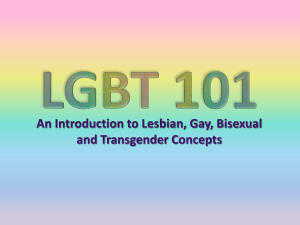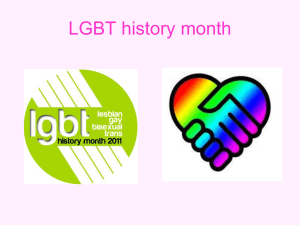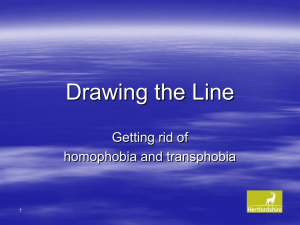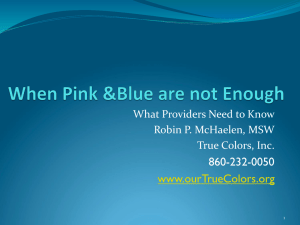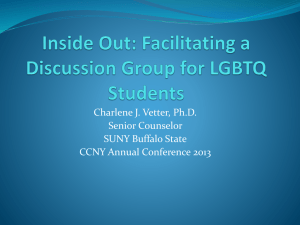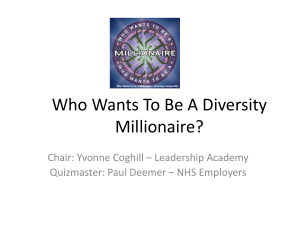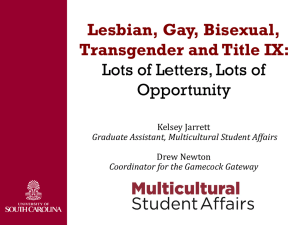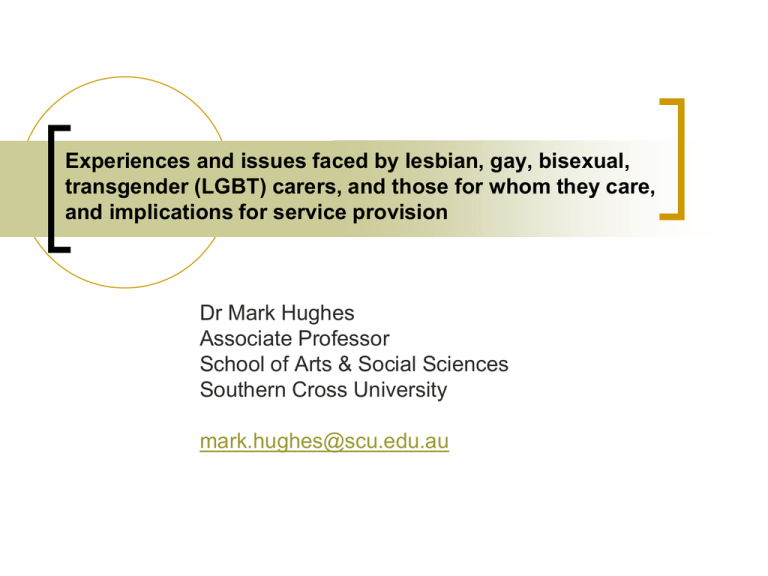
Experiences and issues faced by lesbian, gay, bisexual,
transgender (LGBT) carers, and those for whom they care,
and implications for service provision
Dr Mark Hughes
Associate Professor
School of Arts & Social Sciences
Southern Cross University
mark.hughes@scu.edu.au
Some key concepts
LGBT: lesbian, gay, bisexual and transgender
Transwoman – male to female trans person
Transman – female to male trans person
Homophobia: the fear, hatred or mistrust of LGB people
often expressed in overt displays of discrimination
Heterosexism: the privileging of heterosexuality over
other sexual orientations and identities – creates
obstacles for LGB people in living their daily lives
Heteronormativity: the (often implicit) assumption that
heterosexuality is the norm and is universal – can
render non-heterosexual people invisible
New York LGBT carers survey
46% of NY survey of 341 LGBT people aged 50+
providing care now or within past 5 years
22% (of 341) provided care to member of family of
origin (mainly parents) & 24% to family of choice
(majority partners & friends)
One third providing care to family of origin believed
more was expected of them because of perceived fewer
family responsibilities
41% of family of choice carers were supporting a
person with HIV/AIDS
59% therefore were providing care in relation to other
illnesses commonly found in later life
New York survey cont.
Use of formal services low among both groups of carers
41% of family of origin carers & 26% of family of choice
carers had difficulties with formal providers, often
arising from a fear of discrimination
No difference between men and women re: type of care
provided or no. of hours spent caring
Among both groups, women carers reported greater
carer burden, took more time off work, concealed their
sexual identity more, and had their social life limited
more
Cantor, M., Brennan, M. & Shippy, A. (2004) Caregiving among Older Lesbian, Gay, Bisexual, and
Transgender New Yorkers. New York, NY: National Gay and Lesbian Taskforce Policy Institute
Shippy, R.A. (2007) We cannot do it alone: the impact of informal support and stressors in older gay,
lesbian and bisexual caregivers. Journal of Gay and Lesbian Social Services, 18(3/4), 39-51.
QAHC Survey 2008
Qld Survey 2008 (443 LGBT people, all ages)
identified wide range of sources of support expected in
later life:
Same-sex partners
LGBT friends
Heterosexual friends
Community services
Biological family
10.8% (of 443) providing direct care, of these:
40.4% caring for parents
31.9% caring for partner
QAHC Survey 2008 cont.
65.2% concerned that their sexuality or gender identity
would affect quality of services provided in older age
Main concerns about using aged care or carers services
Not recognising same-sex relationship (51.5%)
Services not inclusive of LGBT people (44.7%)
Service providers being discriminatory (42.4%)
Services being provided by religious organisations
(41.5%)
Lack of LGBT specific services (31.4%)
Carers more likely to be concerned about loss of
independence, having no one to rely on emotionally, &
that their identity will result in lower standard of care
QAHC Survey 2008 cont.
Services wanted:
Information & referrals: 64.1%
Social groups/events: 58.7%
Support groups for LGBT seniors & carers: 55.5%
Co-ordinating & supporting LGBT seniors to
access aged care or carers’ services: 54.9%
Advocacy for LGBT seniors & carers: 54.9%
LGBT specific resources on ageing/carers’ issues:
51.2%
Provision of community services to LGBT seniors &
carers (i.e. direct service provision): 44.7%
Critical issues for LGBT people
Growing up in a time when homosexuality was illegal
& highly stigmatised
Actual current or prior experience of discrimination
Expectation of discrimination when accessing
mainstream services: impact on help seeking
Ageism within LGBT communities, esp. in commercial
‘scene’
Desire for LGBT specific services or providers
Desire for mainstream services to be more LGBT
friendly
Critical issues for LGBT people cont.
Negotiating privacy in identity disclosure
Need for ‘cultural competency’ with LGBT
communities
Need for recognition of complexity of sexuality &
gender identity & community affiliation
Breaking down ‘heteronormativity’ – assumption that
all people are heterosexual
Particular issues for trans people
Many people fear revealing a trans identity
Lower use of health care services – often relying on
emergency hospital care in a crisis
Hormone therapy can lead to other health issues (e.g.
testosterone therapy is associated with heart disease)
Violence, harassment & discrimination are common
experiences
Particular concerns about experiences accessing
community or residential aged care
Very limited research re: transgender caregiving
Issues in common with other carers
Difficulties recognising oneself as a caregiver
Gendered nature of caregiving – needs more research
Variations re: social support & care networks
How formal carers, informal carers & care-receivers
work together (esp. re: negotiation of identity)
Concerns: re: social isolation (esp. for older gay men)
Concerns re: managing work & caring responsibilities
Impact of caring on mental health & general wellbeing
Recognition of the relationship, esp. when in contact
with formal providers
Some ideas for carers services
Develop cultural competency within your teams –
training from is available (e.g. via QAHC & ACON)
Build relationships with LGBT communities
LGBT community organisations
Social groups
Friendship networks
Get involved in advocacy campaigns
Recruit staff/volunteers who are LGBT or who have
expertise in working with these communities
Some ideas for carers services cont.
Develop & display prominently LGBT positive
messages
Back this up with responsive & non-discriminatory
services
Check forms/information sheets etc
Consider strategies to connect people across
distance (e.g. via social networking media)
Current & future research priorities
How LGBT people’s motivations & transitions into
caregiving are similar or different to other carers
How LGBT carers’ & care-receivers’ identities are
disclosed/responded to in delivery of formal care
How carers interact with others in support network &
develop understanding of care-receiver’s needs
How conflict is managed in these relationships
The impact of these interactions & network
participation on health & wellbeing
My publications on LGBT ageing
Hughes, M. (2003) Talking about sexual identity with older men. Australian Social Work, 56(3), 258266.
Hughes, M. (2004) Privacy, sexual identity and aged care. Australian Journal of Social Issues, 39(4),
381-392.
Hughes, M. (2004) Privacy in aged care. Australasian Journal on Ageing, 23(3), 110-114.
Hughes, M. (2006) Queer ageing. Gay and Lesbian Issues and Psychology Review, 2(2), 54-59.
Hughes, M. (2007) Older lesbians and gays accessing health and aged care services. Australian
Social Work, 60(2), 197-209.
Hughes, M. (2008) Information placed in trust: social workers and older gay men on talking about
sexual identity. Geriaction, 26(1), 15-20.
Hughes, M. (2008) Imagined futures and communities: older lesbian and gay people’s narratives on
health and aged care. Journal of Gay and Lesbian Social Services, 20(1/2), 167-186.
Hughes, M. (2009) Lesbian and gay people’s concerns about ageing and accessing services.
Australian Social Work, 62(2), 186-201.
Hughes, M. (2010) Expectations of later life support among lesbian and gay Queenslanders.
Australasian Journal on Ageing. 29(4), 161-166.
Hughes, M. & Heycox, K. (2010) Chapter 9: Sexuality and intimacy. In Older People, Ageing and
Social Work: Knowledge for Practice. Sydney: Allen & Unwin.
Hughes, M. & Kentlyn S. (in press) Older LGBT people’s care networks and communities of
practice: a brief note. International Social Work.
Some LGBT carers resources
Age Concern UK: http://www.ageconcern.org.uk/ageconcern/lesbian_gay_links.asp
Alzheimers Society UK: http://alzheimers.org.uk/Gay_Carers/
American Cancer Society:
http://www.cancer.org/docroot/spc/content/spc_1_Tips_for_Gay_and_Lesbian_Caregivers.asp
American Society on Aging: http://www.asaging.org/networks/lain/lgainlinks.cfm?category=CAREGIVE
Brotman, S., Ryan, B., Collins, S., Chamberland, L., Cormier, R., Julien, D., Meyer, E., Peterkin, A. &
Richard, B. (2007) Coming out to care: caregivers of gay and lesbian seniors in Canada. Gerontologist,
47, 490-503.
Cantor, M., Brennan, M. & Shippy, A. (2004) Caregiving among Older Lesbian, Gay, Bisexual, and
Transgender New Yorkers. New York, NY: National Gay and Lesbian Taskforce Policy Institute.
Family Caregiver Alliance (USA): http://www.caregiver.org/caregiver/jsp/content_node.jsp?nodeid=409
Fredriksen-Goldsen, K.I. & Hooyman, N.R. (2007) Caregiving research, services, and policies in historically
marginalized communities: where do we go from here? Journal of Gay and Lesbian Social Services,
18(3/4), 129-45.
Grossman, A.H., D’Augelli, A.R. & Dragowski, E.A. (2007) Caregiving and care receiving among older
lesbian, gay, and bisexual adults. Journal of Gay and Lesbian Social Services, 18(3/4), 15-38.
Munro, I. & Edward, K. (2008) The lived experience of gay men caring for others with HIV/AIDS: resilient
coping skills. International Journal of Nursing Practice, 14, 122-8.
Reynolds, N. & Alonzo, A. (1998) HIV informal caregiving. Research in Nursing & Health, 21, 251-60.
Shippy, R.A. (2007) We cannot do it alone: the impact of informal support and stressors in older gay, lesbian
and bisexual caregivers. Journal of Gay and Lesbian Social Services, 18(3/4), 39-51.
Shippy, R.A., Cantor, M.H. & Brennan, M. (2004) Social networks of aging gay men. Journal of Men’s
Studies, 13(1), 107-20.
Williams, M.E. & Freeman, P.A. (2007) Transgender health: implications for aging and caregiving. Journal of
Gay and Lesbian Social Services, 18(3/4), 93-108.
Australian reports on LGBT ageing
ACON (2006). Ageing Disgracefully: ACON’s Healthy Ageing Strategy 2006-2009. Surry Hills: ACON
Barrett C. My People: A Project Exploring the Experiences of Gay, Lesbian, Transgender and Intersex
Seniors in Aged-care Services. Melbourne: Matrix Guild of Victoria and Vintage Men, 2008.
Barrett, C., Harrison, J & Kent, J. (2009) Permission to Speak: Determining Strategies Towards the
Development of Gay, Lesbian, Bisexual, Transgender and Intersex Friendly Aged Care services in
Victoria. Melb: Matrix Guild Vic Inc. www.matrixguildvic.org.au/project.html
Birch H (2004) About Time! GLBT Seniors ALSO Matter: Strategic Plan, ALSO Foundation, Melbourne.
Chamberlain C & Robinson P (2002), The Needs of Older Gay, Lesbian and Transgender People: A
Report Prepared for the ALSO Foundation, RMIT University, Melbourne.
Harrison, J & McNair, R (2002) Life Stage Issues in What’s the Difference? Health Issues of Major
Concern to GLBTI Victorians. Melbourne: Ministerial Advisory Committee on Gay and Lesbian
Health, Department of Human Services Victoria, 37-44.
http://www.dhs.vic.gov.au/phd/macglh/difference.htm
Lienert, T., Cartwright, C. &Beck, K. (2010) The Experiences of Gay, Lesbian, Bisexual and
Transgender People around End-of-Life Care. Scoping Study Report. Coffs Harbour: Aged
Services Learning and Research Centre, Southern Cross University.
Pitts, M., Smith, A., Mitchell, A. & Patel, S. (2006) Private Lives: A Report on the Health and Wellbeing
of GLBTI Australians. Melbourne: Gay and Lesbian Health Victoria and The Australian Research
Centre in Sex, Health and Society.
QAHC (2008). The young, the ageing and the restless: Understanding the experiences and
expectations of ageing and caring in the Qld LGBT community. Brisbane: QAHC.
www.qahc.org.au/files/u17/Ageing_Report.pdf
Other Australian
resources on LGBT ageing
Chandler, M., Margery, M., Maynard, N., Newsome, M., South, C., Panich, E. & Payne, R. (2004).
Sexuality, older people and residential aged care. Geriaction, Summer, 5-11
Chandler, M., Panich, E., South, C., Margery, M., Maynard, N. & Newsome, M. (2005). The lion, the
witch and the wardrobe; ageing GLBTIs (gay, lesbian, bisexual, transgender and intersex people)
and aged care: a literature review in the Australian context. Geriaction, Summer, 15-21
Harrison, J. (1999) A lavender pink grey power: gay and lesbian gerontology in Australia. Australasian
Journal on Ageing, 18(1) pp. 32-7.
Harrison, J. (2001) ‘It’s none of my business’: gay and lesbian invisibility in aged care. Australian
Occupational Therapy Journal. 48, 142-5.
Harrison, J. (2002) What are you really afraid of? Gay, lesbian, bisexual, transgender andintersex
ageing, ageism, and activism. Word is Out, 2, March, 1-11.
http://www.rainbowvisions.org.au/resources/wordIsOut_by_JoHarrison.pdf
Harrison, J. (2004) Discrimination and older gays: surviving aged care. Equal Time, 61, August, 1-3,
http://www.lawlink.nsw.gov.au/lawlink/adb/ll_adb.nsf/vwFiles/ET%20Aug%2004%20.pdf/$file/ET
%20Aug%2004%20.pdf
Harrison, J. (2005) Pink Lavender and Grey: Gay, lesbian, bisexual, transgender and intersex ageing in
Australian gerontology. Gay and Lesbian Issues and Psychology Review, 1(1), 11-16
Harrison, J. (2006) Coming out ready or not! Gay, lesbian, bisexual, transgender and intersex ageing
and aged care in Australia: Reflections, contemporary developments and the road ahead. Gay
and Lesbian Issues and Psychology Review, 2(2), 44-53.
Phillips, J. & Marks, G. (2006). Coming out, coming in: how do dominant discourse around aged care
facilities take into account the identities and needs of ageing lesbians? Gay and Lesbian Issues
and Psychology Review, 2 (2), 67-77
Tolley, C., & Ranzijn, R. (2006). Heteronormativity amongst staff of residential aged care facilities. Gay
and Lesbian Issues and Psychology Review, 2(2), 78-86.


